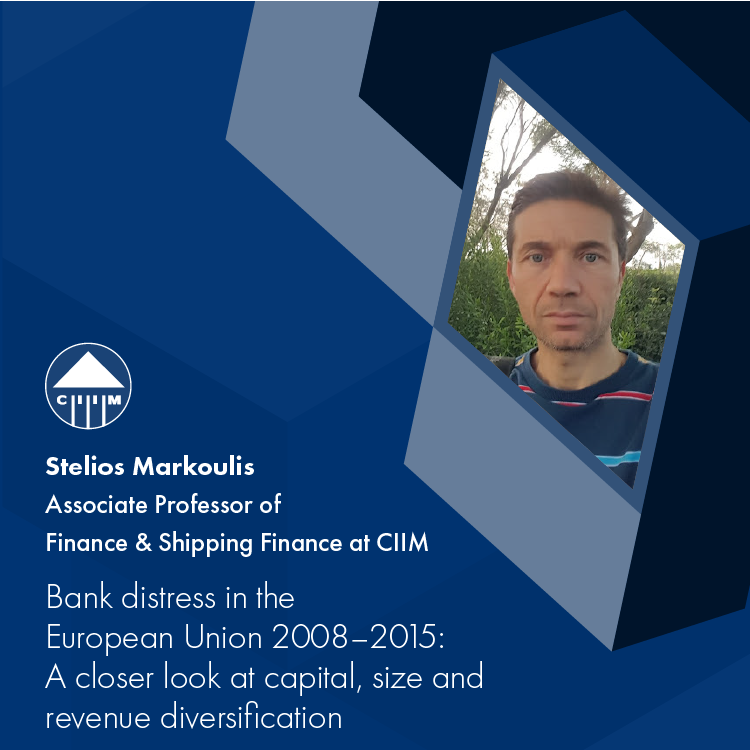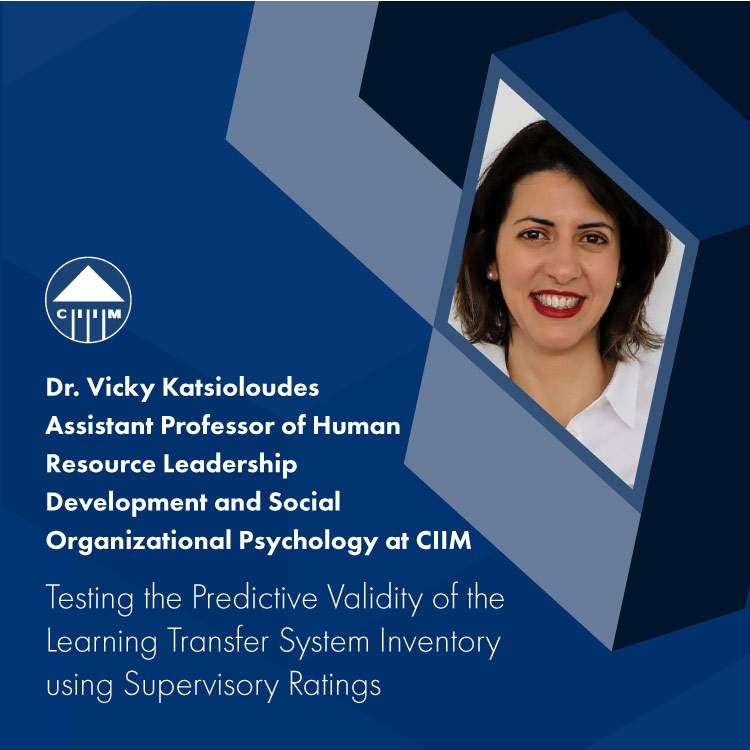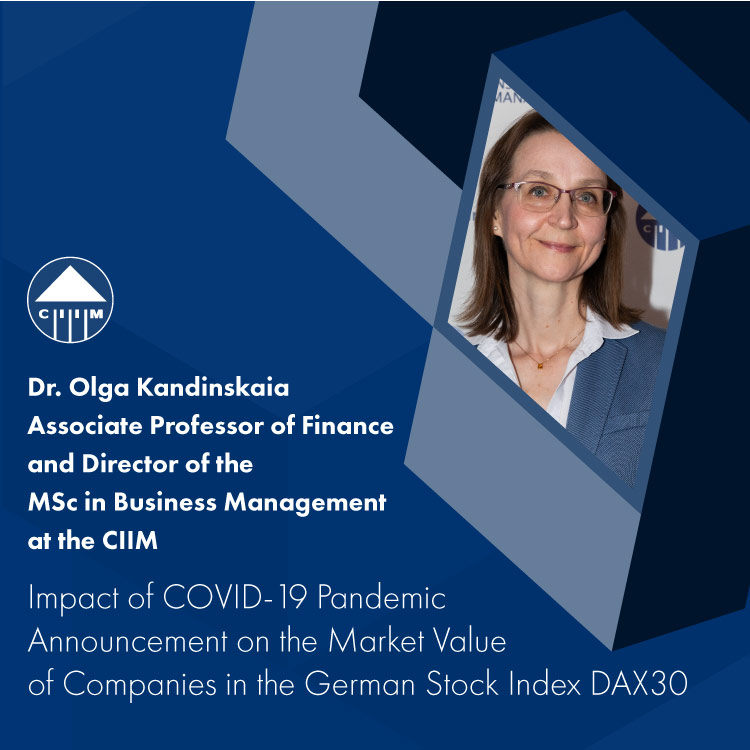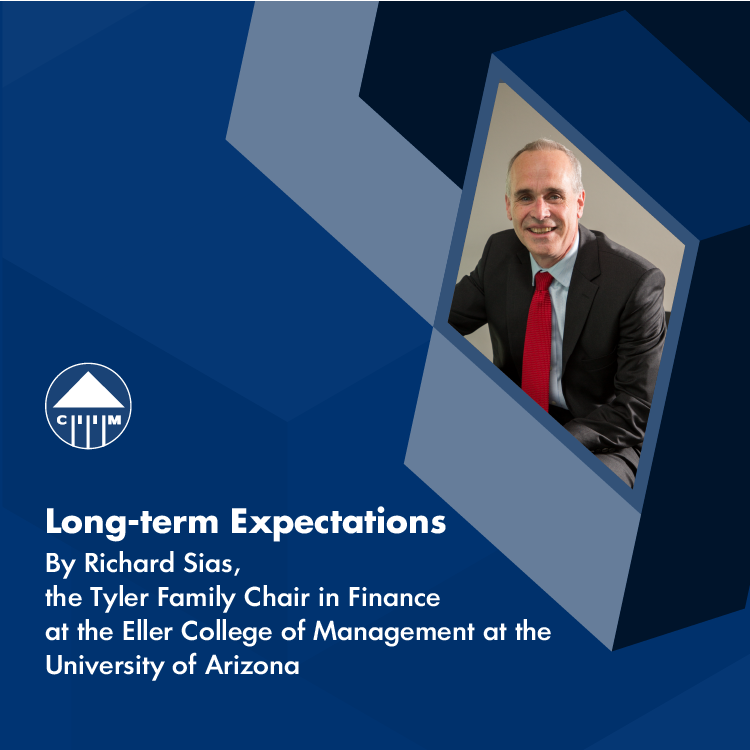Bank distress in the European Union 2008–2015: A closer look at capital, size and revenue diversification
Digital EventOnline Research Seminar 3:00 pm, Friday, 18 March 2022 The recent global financial crisis has clearly highlighted the importance of the timely identification of weak banks. This paper introduces and analyses a new sample of European Union (EU) banks, which faced distress during 2008–2015 and provides evidence regarding the relationship between distress and bank-specific, macroeconomic, banking sector and stock market distress determinants, paying particular attention to issues that have been central following the crisis, such as capital, size, and revenue diversification. Our findings regarding these variables seem to “connect” well with current supervisory actions. The paper also focuses on banks in [...]
Service-Dominant Logic: Theoretical Foundations and Directions.
Digital EventOnline Research Seminar 7:00 pm, Thursday, 24 March 2022 Service-Dominant (S-D) Logic is a mindset, or mental model, for a unified understanding of the purpose and nature of organizations, markets and society. The foundational proposition of S-D logic is that organizations, markets, and society are fundamentally concerned with value co-creation through the direct and indirect exchange of service—the application of one actor’s resources (e.g., knowledge and skills) for the benefit of another. That is, service is exchanged for service; all firms are service firms; all markets are centered on the exchange of service; and all economies and societies are best understood [...]
Alexa, you freak me out – Identifying drivers of innovation resistance and adoption of Intelligent Personal Assistants
Digital EventOnline Research Seminar 3:00 pm, Thursday, 7 April 2022 Intelligent Personal Assistants (IPAs) are increasingly being integrated in many consumer products such as smartphones or cars. However, according to recent research only 50% of the population is using IPAs displaying a certain resistance behaviour. Moreover, studies on the reasons for IPA resistance are not available. Consequently, our study strives to close this research gap by identifying key drivers of innovation resistance and adoption behaviour of IPAs. Using a large-scale online survey (n=168) we find that individual differences, data privacy concerns, trust in AI and perceived creepiness play an important role for [...]
Testing the Predictive Validity of the Learning Transfer System Inventory using Supervisory Ratings
Digital EventOnline Research Seminar 3:00 pm, Thursday, 14 April 2022 This study examined the criterion-related validity of all 16 LTSI General and Specific Scales in relation to training transfer by analyzing secondary data that included measures of key transfer system variables, as captured by the LTSI scales, and individual training transfer as indicated by supervisory ratings. The dataset comprised of employees from diverse organizations who had participated in different types of organizational instructor-led classroom training programs. Confirmatory factor analyses supported the construct validity of the LTSI General and Specific Scales (N = 619). Hierarchical multiple regression analysis measured the unique impact of [...]
Impact of COVID-19 Pandemic Announcement on the Market Value of Companies in the German Stock Index DAX30
Digital EventOnline Research Seminar 3:00 pm, Thursday, 28 April 2022 While the literature in the range of Covid-19 related topics has started to examine the market impact of the pandemic, little evidence exists regarding the effect on the German stock index DAX30. This paper fills in the gap by analysing the impact of the COVID-19 pandemic announcements in March 2020 on the German Stock Index DAX30. Using an event study, we investigate how certain industries and specific companies in the index responded to the news, by using three event windows of different length. It mirrors the expectations and trust of the investors [...]
Contradictory Deviations from Maximization: Environment-Specific Biases, or Reflections of Basic Properties of Human Learning?
Digital EventOnline Research Seminar 3:00 pm, Thursday, 12 May 2022 Analyses of human reaction to economic incentives reveal contradictory deviations from maximization. For example, underinvestment in the stock market suggests risk aversion, but insufficient diversification of financial assets suggests risk-seeking. The leading explanations for these contradictions assume that different choice environments (e.g., different framings) trigger different biases. Our analysis shows that variation in the choice environment is often not a necessary condition. It demonstrates how certain changes in the incentive structure are sufficient to trigger six pairs of contradictory deviations from maximization even when the choice environment does not change. Moreover, our [...]
A Multicountry Measure of Comovement and Contagion in International Markets: Definition and Applications
Digital EventOnline Research Seminar 3:00 pm, Thursday, 19 May 2022 This paper introduces a new measure of comovement and contagion of crises between countries, applies it to 16 world crises, including the current COVID-19 pandemic, and provides insights regarding the occurrence of contagion during these crises. Our measure demonstrates several important advantages over the extant measures of contagion. Traditional measures of contagion, such as increase in correlation, could be limited in scope since they are bivariate, whereas contagion is often a regional or global market phenomenon. The multiple comparisons that the binary correlations require in such cases could yield inconclusive or contradictory [...]
Do You Value What You Have More After Losing It? Extending the Break-Even Effect
Digital EventOnline Research Seminar 3:00 pm, Friday, 3 June 2022 An explanation of the break-even effect (Thaler & Johnson, 1990) is that gains cancelling prior losses receive disproportionate higher values. This explanation is proposed and tested for monetary losses as well as lost property. In Experiment 1 (n=107) investigating choices of risky and sure hypothetical monetary outcomes after a prior loss, the results did not show that risk seeking increased when the risky gain cancelled the prior loss. After a reminder of the opportunity cost (what the lost money could have bought), an increase was observed of the frequency of choices of [...]
Topics from my Recent Research on Imaging and Image Analysis
Digital EventOnline Research Seminar 3:00 pm, Thursday, 23 June 2022 The seminar will be on topics from my ongoing research projects. The first two topics will be on biomedical image analysis projects that I pursue with collaborators. I will start with a novel methodology for MRI image registration. The first involves a statistical estimation of the registration as the non-parametric Bayesian posterior expectation. This estimate undergoes Procrustes analysis to give a rigid transformation. I will show applications of the method to MRI data of a variety of anatomic regions and imaging contrasts. I will then present a methodology to track as well [...]
H2H Marketing: The Genesis of Human-to-Human Marketing
Digital EventOnline Research Seminar 3:00 pm, Thursday, 7 July 2022 H2H Marketing takes the groundbreaking B2B marketing and branding principles and combines them with new ideas and concepts. Combing Philip Kotler’s “Marketing 5.0” and the “Mensch Marketing” developed by Uwe Sponholz and Waldemar Pfoertsch will help to shape this modern way of thinking about and doing marketing. H2H Marketing offers a smart, systematic plan to help any organization move away from conventional marketing and create value propositions for all relevant stakeholders. You don’t have to be an entrepreneur or techie to take advantage of their insights; you only have to be willing [...]
Long-term Expectations
Digital EventOnline Research Seminar 18:30 pm, Thursday, 29 September 2022 Perceived long-term (ten-year horizon) return distributions are remarkably bearish and most individuals believe that uncertainty is only marginally greater in the long term than the near term (one-year horizon), resulting in inferred variance ratios that require unprecedented levels of mean reversion. Although respondents’ near-term beliefs are extrapolative, long-term beliefs are counter-cyclical. Long-term beliefs are more important than near-term beliefs in explaining equity market participation. Respondents agree more about long-term than near-term returns and respondents’ characteristics better explain long-term, versus near-term, belief heterogeneity. These patterns have important implications for understanding household finance and [...]
Smart Environment Enhancement Through Technical and Social Sensors Aggregation
Digital EventOnline Research Seminar 15:30 pm, Thursday, 27 October 2022 Smart cities are ones that deploy innovative technology, create more innovative ways of delivering public services and make better use of data with the ultimate objective of becoming more prosperous, sustainable and a better place to live. Smart environments are usually built on a network of sensors and Internet of Things (IoT) sensing devices to enable real-time monitoring and response. Data collected from the IoT network can be processed both in real-time and a posteriori to provide insights for advancing and automating processes within and for the urban city environment. A large [...]













